“We can’t address the housing crisis by chopping the weed off at the top. We have to pull it out by the roots,” said one panelist at the intimate event in Los Angeles that looked at the issue from the local, state, and federal level.
Apr 09, 2024
We want to educate the public. We want to shift the narrative. We want to organize for transformational and lasting change.
Those were the stated goals and repeated themes at the heart of a three-day event in Los Angeles over recent days, a gathering focused on the national housing crisis organized by the Sanders Institute, spearheaded by co-founder Dr. Jane O’Meara Sanders and executive director Dave Driscoll.
While the policy discussion around housing has a reputation for being dynamic and complex—especially as an issue that straddles municipal, state, and federal governance—the human story at the center of what it means to have a home or be housed is simple and universal, a thread woven into over a dozen panels, presentations, and keynote speeches by progressive lawmakers, top experts, frontline advocates, academics, and community organizers.
In a conversation with Common Dreams, Sanders and Driscoll explained that everyone who attended the event—kept intentionally small and low-profile—was told that the focus would be on “concrete remedies” and “replicable policies” with the ultimate purpose of informing a national audience about not only how severe the housing crisis has become, but also the concrete ways to address it.
“We believe democracy requires an informed electorate and civil discourse and bold ideas. That’s part of our mission,” Sanders said. “And the purpose was to come at the housing crisis from many aspects—not all of the aspects, but many of them—with the goal of actionable solutions.”
“None of us are very interested in making small incremental change, which might mean building some more affordable housing or supporting this or that initiative. That’s not what this is about.” —Dr. Jane O’Meara Sanders, The Sanders Institute
But why housing? Why now? According to Sanders, the issue is potent politically because it’s an issue that is not just about the poor and unhoused, but also central to the working class.
“Everybody knows somebody that has a problem getting affordable housing or just affording their life and having to make different choices,” she told Common Dreams. “It’s middle-income people, it’s everybody having a problem with the housing crisis, and elected officials are getting pressure. Those lawmakers and politicians are hearing it more and more. And we said, okay, now’s the time to bring people together around this.”
Driscoll targeted private equity, Wall Street investors, and real estate developers that have used their outsized economic and political power to further skew the nation’s housing market in search of ever-larger profits, squeezing out low- or middle-income individuals and families in the process.
“It’s just another way in which the gap is growing between the rich and the poor and increasing inequality,” said Driscoll. “And that needs to stop.”
It is powerful interests most of all, says Michael Weinstein, president of the AIDS Healthcare Foundation (AHF), who must be named, shamed, and overcome if any of the progressive solutions championed at the gathering—including rent control, social housing models, community land trusts, more climate-resilient communities, and proven efforts to curb homelessness—are to have any hope of being implemented at the necessary scale.
Weinstein—a driving force behind the event, a supporter of the Sanders Institute, and a major player in California’s healthcare and housing political landscape—agrees fully with Sanders and Driscoll that the moment, both in California and nationally, is ripe for an invigorating politics focused on housing.
Rent Control for All
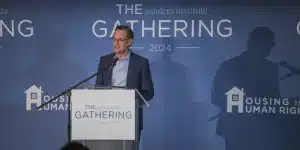
Michael Weinstein, president of the AIDS Healthcare Foundation, presenting at the Sanders Institute event in Los Angeles on Thursday, April 4, 2024. (Photo: © Bryan Giardinelli / The Sanders Institute)
During opening remarks focused on “perpetually affordable housing” and a 2024 ballot initiative in California that would end the state’s existing ban on local rent control ordinances, Weinstein said that he has argued for years that “the housing issue was not high enough on the progressive agenda.”
“This is a battle for the poor and working-class people in California,” Weinstein said of the Justice for Renters campaign, an effort funded by AHF, local unions, and others to see the Justice for Renters Act become law via a ballot measure this year.
“There are 17 million renters in California—that’s 45% of the population,” he explained. “There are tens of millions more renters across the country. Our primary job as progressives is to improve the lives of people and housing is their greatest need.”
If enacted, the law would remove the existing ban on rent control laws in California, encourage expanded rent control at the local level, and curb the power of “predatory landlords” who charge “unfair and unaffordable” rent.
While everyone at the gathering agreed more housing stock is a key part of the solution, Weinstein was among those who emphasized that the biggest obstacle is unaffordability of homes and rental units—a problem attributable to the greed of landlords and the investor class within an economy designed to siphon the wealth of workers into the coffers of the already rich.
“We can’t address the housing crisis by chopping the weed off at the top. We have to pull it out by the roots,” Weinstein explained. “And high rents are the root cause of the housing affordability crisis. It’s that transfer of wealth that’s causing the problem. And if we do nothing about rising rents, then nothing else we do in terms of producing housing or other changes will make a difference. If we continue to treat housing as a commodity, we’ll never be able to house everyone. It’s very similar to healthcare. If we leave it up to the marketplace, we’re lost.”
With the homeless population in Los Angeles estimated to be over 70,000—in a city of approximately 3.9 million—Weinstein said that L.A. is “not just the homeless capital of this country” but the “homeless capital of the world.” This, he lamented, is “truly shameful,” but also the reason why California has a vital role to play in showing people that the crisis can be confronted.
As a veteran healthcare advocate and the head of a nonprofit organization focused on AIDS, Weinstein rejected the accusation he sometimes receives from political opponents that he is somehow “out of his lane” by pushing so loudly and aggressively for rent control reforms. One reason that assessment is wrong, Weinstein explained, is that housing is the largest predeterminant of health, which is also why so many at the gathering rallied around the demand that housing be treated like the human right it is.
“But the main reason I’m involved in housing,” Weinstein told the audience at the gathering, “is that I feel the same outrage about the housing situation and homelessness today as I did in the 1980s about AIDS, where the benign neglect saw tens of thousands of people die needlessly.”
In his remarks, Weinstein stressed the crisis is a result of the most powerful in society refusing to meet the needs of its most vulnerable. But he said the galvanizing potential of housing—and the political potency and opportunities of social uplift embedded in the solutions presented at the conference—must be recognized.
“This is a cry for unity,” he said. “Unity behind rent control and unity behind opposing corporate real estate and unity behind housing justice. There’s no better time than now.”
Putting the Housing Crisis at the Top of the Agenda
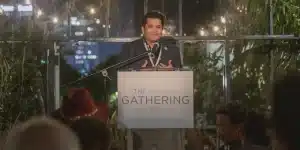 Rep. Jimmy Gomez (D-Calif.) said during the event that Democrats are ready to put housing back at the top of the party’s national agenda. (Photo: © Bryan Giardinelli / The Sanders Institute)
Rep. Jimmy Gomez (D-Calif.) said during the event that Democrats are ready to put housing back at the top of the party’s national agenda. (Photo: © Bryan Giardinelli / The Sanders Institute)
The sense of urgency felt by attendees of the event was unmistakable.
Speaking at the opening night dinner for the conference, Rep. Jimmy Gomez (D-Calif.), who represents parts of Los Angeles County, said the creation of the Renters Caucus in Congress last year is a sign that lawmakers are beginning to take housing more seriously at the federal level.
The goal of the new caucus, Gomez said, “is to make sure that the renters agenda is at the top of the Democratic Party agenda.” This was a focus of all the members of Congress who attended the gathering in some capacity, including Reps. Pramila Jayapal (D-Wash.) and Ro Khanna (D-Calif.) as well as Sen. Bernie Sanders (I-Vt.), also notable as Jane’s husband. Driscoll is their son.
“Housing Should Be a Human Right in the Richest Country in the History of the World”
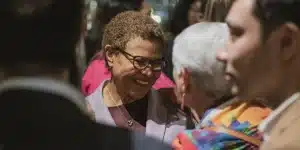 Los Angeles Mayor Karen Bass speaking with attendees at the event focused on the housing crisis, where she delivered an opening speech on the issue that focused on both the local battles for housing and, as a former member of Congress, the need for federal action. (Photo: © Bryan Giardinelli / The Sanders Institute)
Los Angeles Mayor Karen Bass speaking with attendees at the event focused on the housing crisis, where she delivered an opening speech on the issue that focused on both the local battles for housing and, as a former member of Congress, the need for federal action. (Photo: © Bryan Giardinelli / The Sanders Institute)
Democratic Los Angeles Mayor Karen Bass, who left Congress to provide more local leadership, said she did so because she saw that the rightward political shift at the local government level was set to take the city backward on a numerous fronts, including on the issues of affordable housing, education, and homelessness.
Calling housing “one of the most important issues of our lifetime right now,” Bass praised the Sanders Institute’s focus on the crisis and for bringing the event to California. “I know that you are going to be the brains behind what we need, which is a national movement,” said Bass. “That’s the only thing that is going to bring about the type of fundamental change that we need.”
“What we need… is a national movement.” —Los Angeles Mayor Karen Bass
Speaking after Jayapal—who had told the audience the battle for better housing policy in the United States should be viewed much like the battle for universal healthcare—Bass acknowledged there are things on the housing agenda that will require action by leaders at every level of government.
“But nothing takes the place of the grassroots day-to-day organizing that is needed,” she said, “so that we can win what Pramila said: Housing should be a human right in the richest country in the history of the world, just like healthcare should be a human right.”
According to Sen. Sanders, who delivered the keynote address and was an active participant throughout, the purpose of the gathering was to get beyond talk in order to get down to the real work of making change.
“Our task is to organize and to educate,” Sanders said. “It’s easy to come up with rhetoric—which I have done once or twice in my life—but when you’re the mayor of a city, you’re going to need some concrete plans. How do you do it? You’re going to have to bring a lot of smart people together to figure out the best way forward.”
Social Housing: A Solution That Works
 California Assemblyman Alex Lee (D-25), center, and South San Francisco Mayor James Coleman, right, present on social housing models during the event in Los Angeles on Thursday, April 4, 2024. (Photo: © Bryan Giardinelli / The Sanders Institute)
California Assemblyman Alex Lee (D-25), center, and South San Francisco Mayor James Coleman, right, present on social housing models during the event in Los Angeles on Thursday, April 4, 2024. (Photo: © Bryan Giardinelli / The Sanders Institute)
A constant theme at the event was that not only does the housing crisis demand progressive solutions, but the implementation of those solutions are themselves opportunities to revive democracy, increase social cohesion, and expand the public imagination.
In their joint presentation on social housing, California Assembly member Alex Lee (D-25) and South San Francisco Mayor James Coleman, also a Democrat, detailed a vision for “social housing” which aims to demolish preconceived notions that tend to dominate understandings of “public housing” throughout the United States.
When it comes to defining the term “social housing,” Lee explained that he likes to “keep it simple.” Social housing, he said, “is beautiful, sustainable, and publicly led developed housing that is available to everyone and for everyone.”
The idea of universality, he emphasized, is critical in the U.S. context where public housing is typically subsidized housing only for low-income individuals or families. Social housing models across the world provide housing across economic classes, which creates more buy-in from communities and residents.
“There’s a very deliberate reason of why we stick to the term social housing,” Lee said, “even though it is three letters away from a scary thing that Americans fear.” But it is the term used around the world, he explained—both in highly capitalistic economies like Singapore’s as well as in the various social democracies of Europe and beyond.
Because it’s housing for everyone—the poor, the middle class, and even the upper-middle class—Lee and Coleman explained that “universality” and the lack of means-testing are core components of a model they believe can transform people’s understanding of what’s possible in this country.
“With social housing,” argued Coleman, “you’ll see broad spots of the public be able to look at it and say: ‘That is quality housing. I want to live there. I want my children to live there and I know I’m going to be paying lower rents than market rate.’ And when people start seeing that, then they’re going to want to continue to invest in social housing and we won’t see the decades of disinvestment that we have seen here in the United States for our public housing program.”
In an interview with Common Dreams, Lee offered a parallel example.
“In America,” he said, “there is no constitutional guarantee of education, yet every parent will wake up tomorrow not having a single doubt in their mind that their child will go to school.” Lee acknowledged not all children go to the same kinds of school, but said that people never doubt that education will be there for their families.
“But there is not the similar sense of options in housing—people don’t have that.” But they should, he said, and there are models out there—not just abroad but also examples in the U.S.—that show how it could work.
Citing housing construction in the post-war years, Lee said the country has shown it’s capable of amazing things when it comes to housing.
“We could end the housing crisis in four years, at true scale,” said Lee. “That’s why it’s really important to prove that this can work at the state level, especially in a state as populous as California. If we prove the concept here, we can show nationally how it can be done.”
Like the Housing Crisis, “The Climate Crisis Is Actually a Massive Health Crisis”
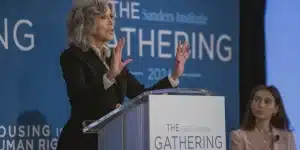 Actor and activist Jane Fonda and community organizer Nalleli Cobo speak to the audience at The Gathering. (Photo: © Bryan Giardinelli / The Sanders Institute)
Actor and activist Jane Fonda and community organizer Nalleli Cobo speak to the audience at The Gathering. (Photo: © Bryan Giardinelli / The Sanders Institute)
During another session, actor and activist Jane Fonda presented alongside local activist Nalleli Cobo, a cancer survivor who has been fighting the oil industry that operates drilling wells in her urban neighborhood since she was a child.
Cobo, co-founder of the South Central Youth Leadership Coalition and a 2022 Goldman Environmental Prize winner for the activism that she initiated while still a teenager living in South Los Angeles, told the audience that the hard-fought victories she and her allies were able to win against the fossil fuel industry “were made possible because of a frontline community that was historically viewed as silenced, invisible, and disposable finally said: ‘Enough is enough. We deserve to open our windows and our home and we deserve to breathe clean air.'”
“This is the largest crisis humanity has ever faced. We’re running out of time and we have to fight back.” —Jane Fonda
Living her whole life in a home neighboring a fossil fuel operation beset Cobo with health challenges throughout her childhood and ultimately led to a cancer diagnosis. Now three years in remission, she said affordable and healthy housing is something that every single member of society is entitled to.
“They may not be drilling in your community right now, but they can be unless we stand up and fight back,” she said.
With nearly 3 million Californians living within a mile or less from oil and gas drilling wells, Fonda championed the courage and determination of Cobo to end this toxic practice, including with a ballot fight in California this year to ban such operations permanently.
“What Nalleli didn’t tell you,” Fonda told the audience when she took the podium, “is that at age 10 and 11, she and her mother had to be put into a witness protection program because of her organizing in the community to shut the oil well down; that at 19 she had to have a total hysterectomy; that her dream was to be a dancer and now that is no longer possible for her.”
People must understand, Fonda said, that “the climate crisis is actually a massive health crisis” for people living in communities made toxic by fossil fuels all over the country and around the world. A cancer survivor in her own life, Fonda said she was told by someone when she threatened to tattoo the phrase “climate emergency” on her bald head if the chemotherapy took her hair that “the cancer community doesn’t like to be looped in with other causes.”
“Causes?!” she recalled exclaiming in response. “Honey, the climate crisis is not a cause. This is the largest crisis humanity has ever faced. We’re running out of time and we have to fight back.”
Climate Resilience and Housing Justice
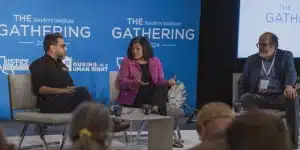 (From left): Author and labor organizer Saket Soni, Rep. Pramila Jayapal (D-Wash.), and Consumer Watchdog’s Jamie Court. (Photo: © Bryan Giardinelli / The Sanders Institute)
(From left): Author and labor organizer Saket Soni, Rep. Pramila Jayapal (D-Wash.), and Consumer Watchdog’s Jamie Court. (Photo: © Bryan Giardinelli / The Sanders Institute)
Also on the climate front—which highlighted the intersectional style of the Sanders Institute’s gathering—Congresswoman Jayapal joined with author and labor organizer Saket Soni as well as Jamie Court of the California-based Consumer Watchdog, an advocacy group, to discuss the linked issues of community resilience amid extreme weather disasters and soaring insurance costs that have arrived hand-in-hand with rising global temperatures.
While Soni in his work has been at the forefront of building up climate resilience in communities for decades—both by helping to mitigate the impact of extreme weather and also working on disaster relief and rebuilding—Jayapal explained that she has a bill in the U.S. House—called the Climate Resilience Workforce Act—that would formalize processes and establish funding to make such work a more integral part of federal, state, and local planning.
Among others, one component of the legislation would be to make sure that people in communities “disproportionately affected by climate change are actually at the table” when federal funds are dispersed.
According to the panel, the increasing impacts of climate change are a key driver of housing costs but nothing will get better without a justice lens through which to see the crisis of housing in an increasingly hotter world that is resulting in more floods, larger fires, and too little accountability for the corporate interests profiting from those extremes.
“In the context of our climate crisis,” Soni explained during the panel discussion, “there is an opening for justice that Jayapal’s bill is trying to take and that we’re all trying to take. There is an opening where resilience is a framework that can accelerate housing justice, justice for the incarcerated, and justice for immigrants. And that’s what we should all be trying to do, is look at how resilience is a real majoritarian framework—maybe one of the last ones left in our country—and inside of that there is so much consensus that we can push justice forward in many, many ways.”
“There Is a Lot of Potential for Prop 1”
 California’s Democratic Gov. Gavin Newsom talks with Rep. Ro Khanna (D-Calif.) during the event in Los Angeles on Thursday, April 4, 2024. (Photo: © Bryan Giardinelli / The Sanders Institute)
California’s Democratic Gov. Gavin Newsom talks with Rep. Ro Khanna (D-Calif.) during the event in Los Angeles on Thursday, April 4, 2024. (Photo: © Bryan Giardinelli / The Sanders Institute)
On the state level, California’s Democratic Gov. Gavin Newsom arrived at the event to champion the recently approved measure known as Proposition 1, which will, among other things, provide state revenue from a nearly $6.4 billion bond to build and service more treatment beds for those experiencing severe mental health and addiction disorders as a way to curb homelessness across California.
During a panel discussion with Sacramento Mayor Darrell Steinberg and California Secretary of Health & Human Services Dr. Mark Ghaly, both Democrats, Newsom said that Prop. 1 would allow for a “strike force” that could better confront the overlapping issues of housing, homelessness, mental health, and substance addiction disorders.
Acknowledging the potential for hyperbole, Newsom said he believes what’s contained in the new law “are the most significant” and far-reaching “behavioral health reforms happening anywhere in the United States of America.”
While the debate over Proposition 1 was heated in the state, including among progressives who landed on various sides of the initiative, a subsequent panel focused on the implementation mostly landed on the side of cautious optimism for what it could be and what kind of model it might represent.
“There is a lot of potential for Prop 1,” said Dr. Margot Kushel, professor of medicine at University of California San Francisco and director of the UCSF Benioff Homelessness and Housing Initiative.
“No matter where you stood on it before it passed,” Kushel added, “there is a lot of potential now that it’s here and we need to exercise that in the right way, which is that we need to be sure that it is used to enable these living-in-the-community, choice-driven, client-driven, but very supportive programs for people who are suffering terribly.”
The evidence for what it will take to solve the mental health crisis as it pertains to homelessness, said Kushel, is overwhelming. “You don’t need me to do more studies on it,” she said, “we actually just need to bring to bear that funding [supplied by Prop 1] to solve some of these really sticky funding issues so that we can create the workforce, sustain the workforce, and create the programming” that will really serve the unhoused population “with dignity” in the communities they live in.
Several researchers presented on the severe impacts that homelessness and housing insecurity have on students and young people, including those in the foster care system. Other presenters described how community land trusts and other innovative housing collaborations, including faith-based initiatives, are providing models that could be replicated nationwide. Separately, a panel focused on the struggle of homeless veterans told the harrowing tale of former U.S. soldiers denied access to housing and care in Los Angeles who remain in a protracted legal fight with the U.S. Department of Veterans Affairs over land set aside for exactly that purpose.
“We don’t suffer from scarcity in this country, we suffer from greed. We have enough money to house people and to create situations where people aren’t going to fear for what tomorrow’s going to look like.” —Rep. Pramila Jayapal
In her reflections as a presenter and participant of the gathering, Congresswoman Jayapal explained to Common Dreams that the event was significant because “it lifted up an issue that” has been central for progressives but too often ignored and neglected by those in the media and within both major political parties.
“We don’t suffer from scarcity in this country. We suffer from greed,” Jayapal said. “We have enough money to house people, and to create situations where people aren’t going to fear for what tomorrow’s going to look like.”
“We Need to Call Out the System”
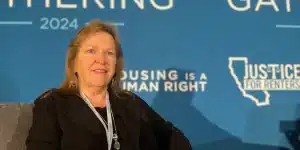 Sanders Institute co-founder Dr. Jane O’Meara Sanders in Los Angeles on Friday, April 5. “We’re talking about transformational change,” she said about the event. (Photo: J. Queally / Common Dreams)
Sanders Institute co-founder Dr. Jane O’Meara Sanders in Los Angeles on Friday, April 5. “We’re talking about transformational change,” she said about the event. (Photo: J. Queally / Common Dreams)
The germination of the gathering, Jane Sanders explained to Common Dreams in the wake of the three days, was like “peeling back the onion” as one area of focus led to another, and a discussion with one invited expert resulted in the introduction to another.
As she realized the issue of housing was such a “hornet’s nest” of intersecting issues, overlapping viewpoints, and innovative thinking, Sanders said it became increasingly clear that was exactly the reason to go forward with the event.
“We’re talking about transformational change,” she said of the work that she, Driscoll, and their colleagues are doing at the Sanders Institute. “None of us are very interested in making small incremental change, which might mean building some more affordable housing or supporting this or that initiative. That’s not what this is about.”
The Sanders Institute was initially in founded in 2018 with the goal of extending the energy, ideas, and political movement sparked during Bernie’s presidential run in 2016. When the senator decided to run again in 2020, Jane and Dave decided to pause operations and then went into full hiatus when the coronavirus pandemic hit. In this context, holding an intimate housing conference in Los Angeles was conceived as a reawakening for the organization and a chance to let people know the time has now arrived to continue their original mission.
Reflecting on his experience after the gathering had concluded, Driscoll said it had been great to see so many people—whether in government or through an organization or at the grassroots level—having the chance to connect, learn from one another, and hopefully collaborate in the future.
“Sometimes this can be a lonely fight, whether or not you’re fighting for housing or you’re fighting for healthcare, sometimes you feel like you’re not getting anywhere,” he said. “But when you bring all these people together like we did over the last couple days, I felt at times a real energy in the room. People felt good about a really tough fight. So I think it inspired and fired people up, and also gave people hope for the future.”
While they don’t have it pinned down yet—that was the admission of the gathering—the point going forward is to clarify what the progressive agenda on housing should be and help push out to others how that fits into the broader movement for bold and lasting change.
When it comes to the opponents of such transformational proposals—national rent control, expansion of social housing, ending homelessness, or forging the Green New Deal for public housing—Driscoll said it’s important that people understand powerful financial interests will fight such ideas with everything they have.
“We need to start calling people out like we did with tobacco money or with oil money,” Driscoll said. “We need to start calling people out and saying, you’re taking money from big real estate and developers that are causing this harm and stopping this progress.” As is true in so many other areas of policy and politics, he said, following the money will be key in the battles to come.
“I don’t like to call out individuals,” Sanders said, “but we need to call out the system.”
“It’s a systematic problem that we don’t say ‘housing is a human right.’ That’s not shared in a capitalist society,” she continued. “Not everybody would agree with that statement. We agree with that statement, but it’s not one of those accepted truisms in this country. So what’s our goal? That it become one.”